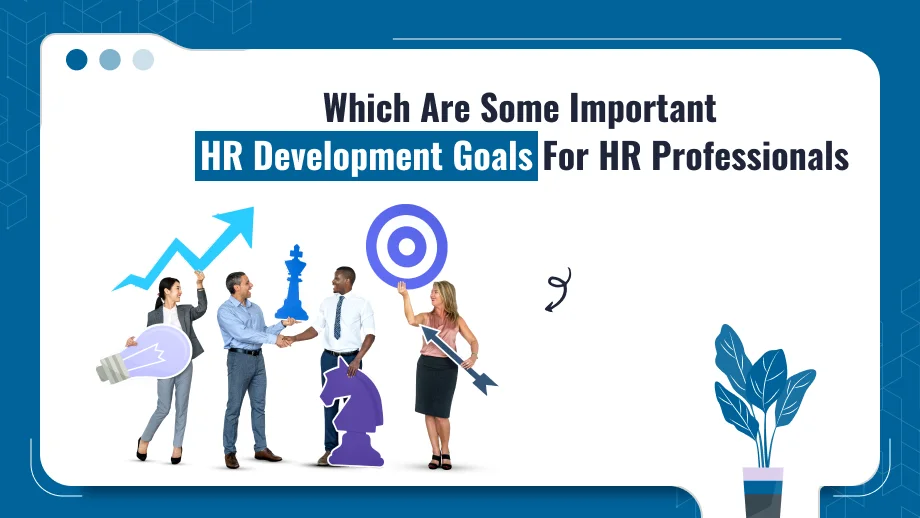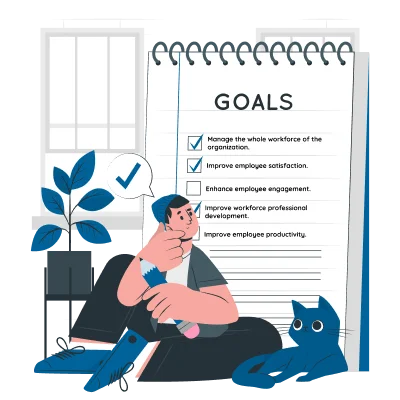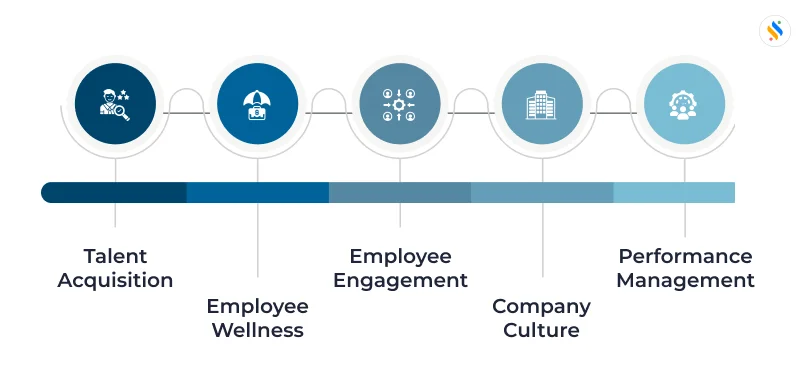The goal of HR development is to enhance the skills, knowledge, and capabilities of employees. It is ensuring they contribute effectively to the organization's success.
Grab a chance to avail 6 Months of Performance Module for FREE
Book a free demo session & learn more about it!
-
Will customized solution for your needs
-
Empowering users with user-friendly features
-
Driving success across diverse industries, everywhere.
Grab a chance to avail 6 Months of Performance Module for FREE
Book a free demo session & learn more about it!
Superworks
Modern HR Workplace
Your Partner in the entire Employee Life Cycle
From recruitment to retirement manage every stage of employee lifecycle with ease.



Seamless onboarding & offboarding
Automated compliance & payroll
Track performance & engagement
Which Are Some Important HR Development Goals For HR Professionals?
- top hrms software
- 9 min read
- August 14, 2024

Human resources are massive! There are multiple things included in the HR!
Since HR departments play a key role, it’s important to set HR development goals early to make sure the best talent is used effectively across all operations. HR development goals drive growth and innovation and set standards to measure the department’s success and reliability.
To keep employees, HR must create ways to make every goal will be fulfilled. They should consider the ways to solve HR strategic challenges & encourage staff, keeping morale high. The more often these strategies are used, the more in tune HR departments will be with employee feelings.
In human resources, setting HR development goals isn’t just a suggestion—it’s essential for professional success. These HR Goals and objectives act like guiding lights for HR managers, showing the way for every policy, talent, and conflict. These HR goals in HR define what success looks like and help ensure that every step taken is purposeful toward career goals.
In this blog, we will explore what are HR objectives, their benefits and some of the most important goals HR professionals should focus on.
What Are HR Goals?
HR goals are specific objectives set by human resources departments as an important HR strategy. The HR development goals are designed to
- Manage the whole workforce of the organization.
- Improve employee satisfaction.
- Enhance employee engagement.
- Improve workforce professional development.
- Improve employee productivity.
While other departments are busy hr planning, producing, launching, and marketing the company’s products, human resource management services make sure that the people in those departments feel satisfied at work.
Improve Employee Satisfaction by 40% With Clear HR Goals!
Let Superworks guide You in Creating a Motivated workforce.
Benefits Of Setting HR Smart Goals For Your Team
Setting SMART HR development goals or objectives across departments helps bring people together, makes team members accountable, and encourages positive and productive work habits.
Here are some major benefits of HR manager goals for the office.
1. Enhanced Strategic Alignment
HR development goals ensure that the HR department’s objectives are directly aligned with the organization’s strategic goals. By setting clear targets, HR can contribute more effectively to overall business success. This alignment fosters collaboration between departments.
- Strategic Focus: When HR goals are aligned with business objectives, it creates a coherent strategy. This improves professional development.
- Resource Allocation: Development goals help in prioritizing resources towards initiatives that offer the highest value.
2. Improved Accountability and Transparency
Development goals provide a clear framework for accountability. When human resources goals are specific and measurable, it becomes easier to track progress and hold team members accountable.
- Performance Metrics: Establishing clear metrics allows HR professionals to measure success and identify areas for improvement.
- Transparency: Clear HR goals promote transparency, as everyone understands what is expected and how success is measured.
3. Increased Motivation and Engagement
Setting a culture of HR development goals can boost motivation by providing clear and achievable targets. When team members know exactly what they need to accomplish.
- Recognition and Rewards: Achievable goals create opportunities for employee rewards examples, further motivating the team.
- Empowerment: Clear goals empower team members to take ownership of their tasks and contribute to the overall mission.
4. Better Resource Management
The HR goals facilitate efficient resource management by identifying the most critical areas. This helps HR teams allocate their time, budget, and manpower more effectively.
- Prioritization: When it comes to high-impact goals, Human resources can concentrate on initiatives that drive the most significant results.
- Efficiency: Clear objectives streamline processes and eliminate unnecessary activities.
5. Facilitates Continuous Improvement
The goals for HR encourage a culture of continuous improvement by providing a framework for regular evaluation. This approach allows HR teams to learn from their experiences and adapt strategies as needed.
- Feedback Loops: Regular progress reviews provide opportunities for feedback and course correction.
- Adaptability: The right goals allow HR to be agile and responsive to changing organizational needs and market conditions.
5 Important HR Development Goals For Your Office
Technology has greatly changed how HR works for employees. Many HR professionals’ tasks, like hiring, onboarding, performance, diversity and inclusion, and payroll, now depend a lot on technology such as HRMS payroll software in India.
Now, let’s explore some HR goals for 2024.
1. Talent Acquisition
Objective: Attracting and retaining top talent is a fundamental goal for HR professionals. By developing effective recruitment strategies such as flexible work setup, competitive salary, etc. you can make HR development goals fulfilled.
It is essential to bring skilled and diverse individuals who align with the company’s values and objectives.
Strategies:
- Employer Branding: Strengthen your company’s brand to attract top candidates.
- Data-Driven Recruitment: Utilize data analytics in HR to make informed hiring decisions.
- Diverse Talent Pools: Expand your search to include a diverse range of candidates.
2. Employee Wellness
Objective: Focusing on employee wellness enhances productivity and reduces absenteeism. HR should aim to create a healthy work environment that supports physical, and mental health & work-life balance.
Strategies:
- Wellness Programs: Implement programs that promote physical health, mental health, and work-life balance.
- Flexible Work Arrangements: This offers flexible schedules and remote work options.
- Supportive Culture: This fosters a culture that prioritizes employee well-being.
3. Employee Engagement
Objective: Improving employee engagement is essential for increasing productivity. HR should have the ability to keep employees motivated and committed to their work.
Strategies:
- Employee Engagement Activities In HR: Organize activities to focus on team bonding and motivation.
- Feedback Mechanisms: Create channels for regular feedback and communication.
- Recognition Programs: Recognize and reward employee contributions.
4. Company Culture
Objective: Building a strong company culture that aligns with organizational values & professional development. The HR development goals are crucial for long-term success. It is crucial to cultivate a positive and inclusive culture with flexible work.
Strategies:
- Cultural Alignment: Ensure the company values are reflected in everyday practices.
- Diversity and Inclusion: Promote diversity and create an inclusive work environment.
- Cultural Ambassadors: Identify and empower employees who embody company culture.
5. Performance Management
Objective: Effective performance management systems help HR professionals track employee performance. It drives continuous improvement. This goal involves setting clear expectations and providing regular review and feedback.
Strategies:
- Performance Metrics: Establish clear and relevant performance metrics.
- Feedback: Conduct regular performance checking and feedback.
- Development Plans: Create personalized development plans for employees.
How To Implement Goals in HR ( Human Resources)?
The implementation phase means turning the strategic goal into real actions. It is like choosing the right HR technologies and tailoring them by providing training programs to fit the company’s needs.
This ongoing process helps companies improve their HR tasks, make processes more efficient, and enhance overall employee experiences.
Implementing HR development goals in 2024 requires a structured approach from both HR professionals. Here are expanded steps to ensure successful implementation:
1. Set Clear and Realistic Goals
Always set clear and realistic HR development goals. Ensure that each HR goal follows the criteria to maximize effectiveness.
- Specific Objectives: Clearly define what you want to achieve and the specific actions required.
- Measurable Targets: Establish quantifiable metrics to track progress and success.
2. Conduct a Needs Assessment
Begin by conducting a thorough needs assessment to identify the most critical areas for improvement within the HR function. This change management analyzes current processes, identifying gaps, and understanding organizational priorities.
- Data Analysis: Utilize HR data analytics to gain insights into workforce & HR trends and identify areas that require attention.
- Reports: Check the different kinds of HR reports to know the actual needs of employees to fulfill goals.
3. Develop an Action Plan
Create a detailed action plan outlining what to work on. This plan should include timelines, resources, and responsibilities to ensure accountability.
- Timeline: Set realistic deadlines for each step to maintain momentum and focus.
- Resource Allocation: Identify the resources needed, including budget, personnel, and technology, to support goal implementation.
4. Engage with the Team
Engage with the HR team and other relevant departments. It is crucial to ensure everyone is on board and understands their role in achieving the goals.
- Regular Updates: Provide regular updates on progress to keep everyone informed and engaged.
- Feedback: Create a medium to provide feedback and suggest improvements.
5. Monitor Progress as Needed
Regularly monitor progress towards achieving the HR goals and make adjustments as necessary. This involves evaluating outcomes and identifying any obstacles to staying on track.
- Performance Reviews: Conduct regular performance reviews and feedback cycles.
- Continuous Learning: Encourage a culture of continuous learning and adaptability, allowing the HR team to refine strategies.
6. Celebrate Successes
Recognize and celebrate achievements to motivate the team. It reinforces the value of setting and achieving HR goals. Additionally, analyze any failures to understand what went wrong and how to improve in the future.
- Recognition Programs: Implement recognition programs to reward team members for their contributions.
- Post-Mortem Analysis: Conduct post-mortem analyses to learn from challenges and enhance future performance.
7. Develop Future-ready Leaders
Focus on cultivating leaders who can navigate future challenges and drive the organization forward. By developing future-ready leaders, HR ensures the organization remains resilient and competitive.
- Leadership Training: Provide programs to build essential skills like decision-making and strategic thinking.
- Succession Planning: Identify and prepare potential leaders to ensure continuity.
- Innovation: Encourage leaders to embrace innovation and adapt quickly to change.
By following these steps, HR professionals can effectively implement development goals that drive organizational success and foster a positive work environment.
Wrapping Up
Setting and achieving HR development goals is essential for HR professionals to drive organizational success. By focusing on talent acquisition, employee wellness, engagement, company culture, and performance management, HR teams can make a significant impact. Implementing these goals requires a strategic approach and the Top HRMS software can help for that.
Fulfill the HR development goals with Superworks, which can help to manage all your HR operations.
Also see: joining report after earned leave
FAQs
What Is The Goal Of HR Development?
What Is Your Goal As An HR?
As an HR professional, your goal is to support the organization's objectives by attracting, retaining, and developing talent. It is fostering a positive work environment, and promoting employee well-being.
What Is An Example Of A Smart Goal For HR?
An example of a SMART goal for HR is: "Increase employee engagement within the next six months through the implementation of monthly team-building activities and regular feedback sessions."
What Is an HR Development Plan?
An HR development plan outlines the strategies and actions required to enhance the skills and capabilities of employees, aligning them with the organization's goals.
What Are The 7 Goals Of HRM?
The 7 HR goals include talent acquisition, employee development, performance management, employee engagement, company culture, compliance with labor laws, and strategic HR planning.






